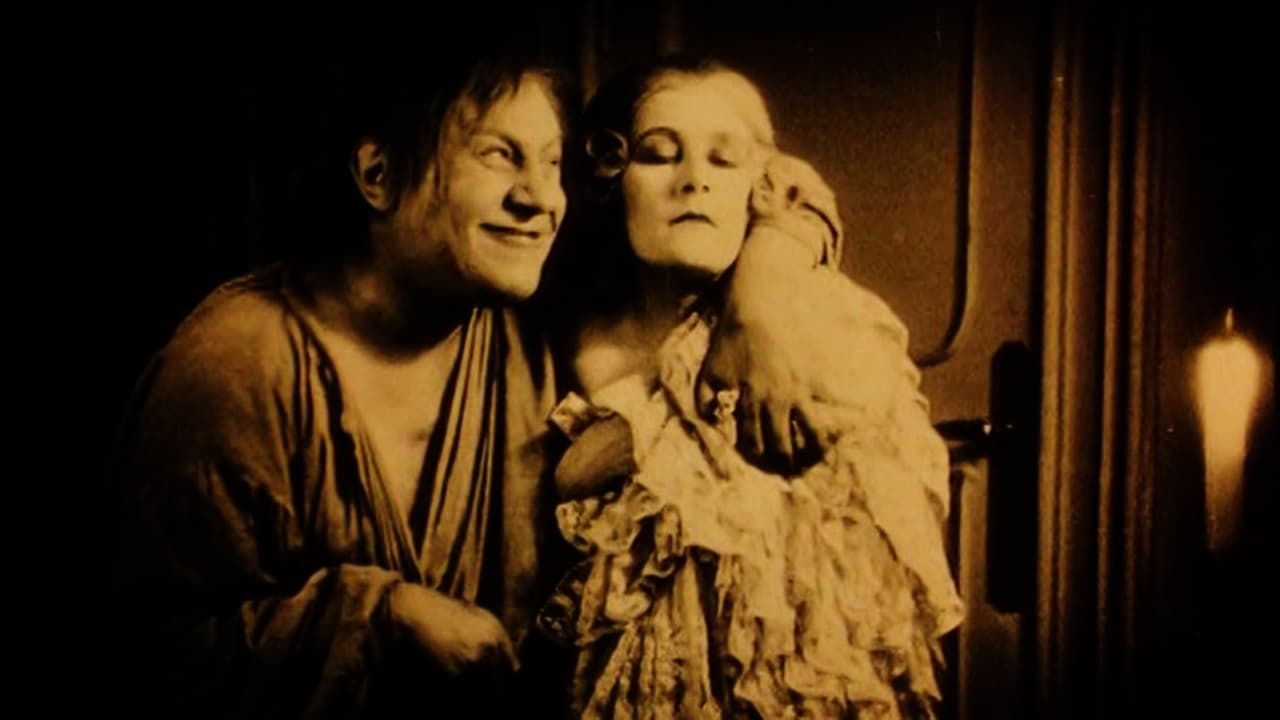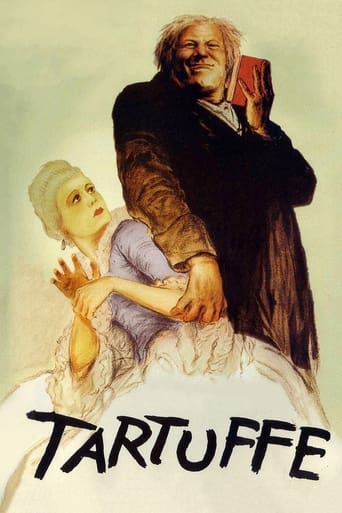Cleveronix
A different way of telling a story
Ava-Grace Willis
Story: It's very simple but honestly that is fine.
Tobias Burrows
It's easily one of the freshest, sharpest and most enjoyable films of this year.
Zandra
The movie turns out to be a little better than the average. Starting from a romantic formula often seen in the cinema, it ends in the most predictable (and somewhat bland) way.
Horst in Translation (filmreviews@web.de)
"Herr Tartüff" or "Tartuffe" is a German, black-and-white silent film from over 90 years ago. It was directed by Friedrich Wilhelm Murnau/Plumpe, probably the number 2 of his time in terms of the genre and region behind Fritz Lang of course. "Tartuffe" is neither among his most known nor his least known works. The original ran for slightly over 70 minutes, but the new DVD version, also the one I watched, only runs for slightly over 60 minutes, probably because of lost scenes or just more frames per second.The cast includes a couple really famous names such as Emil Janning and Lil Dagover, but sadly the story and script never impressed me that much that I would say this is a rewarding watch. I found it very forgettable. The ending is okay and the film has its moments, but overall, even for such a short runtime, the material simply is not good enough and the actors also fail to elevate the material we have here. This one is only worth seeing for the biggest silent film fans. Everybody else should skip it.
MartinHafer
While this film does not have the amazing scenes with breathtaking cinematography like FAUST or SUNRISE, this Murnau film still does excel due to the camera-work and great care taken in its production. And, while not the very best silent film available, it's certainly among the better ones.This story differs from Molière's play in that the entire play is actually part of a larger story--with a prologue and epilogue. The story begins with a rich old man living alone with his supposedly devoted housekeeper. She has convinced the man that his grandson is evil and should be disinherited because he is, oh, horrors,...an ACTOR!!! Instead, she's fooled him into making her the beneficiary. When the grandson shows up to say hello, the old man chases him away and it appears the housekeeper has won. However, given that the young man is an actor, he dresses up as a traveling showman and comes to the house to show them a film--TARTUFFE.The film stars Emil Jannings as the evil priest, Tartuffe, who has fooled a rich nobleman into forsaking the pleasures of life and becoming an aesthetic, like him. But, the man's wife soon realizes the priest is a charlatan and much of the movie is spent trying to trap the priest in his lies. Naturally, all this is symbolic of the relationship between the housekeeper and the rich man.The sets, direction and acting are all excellent. The acting is rather restrained compared to some silent films and the story is told in a brisk and watchable manner.
OsbourneRuddock
Personally I think the other reviewers have been way too hard on this film, and I certainly don't agree that it is "extremely average", "throwaway" or "plain and forgettable". OK - it's not his best by a long shot, but Murnau was such a talented directer/artist that even his weaker films urinate all over the films of most other directors. I thought that the 'film within a film' structure of it worked brilliantly. The cast were all excellent in their acting. The film is pretty great visually too (as one would expect from Murnau) - the 'outer' film is shot in a crisp, modernist style, with adventurous camera angles and no make up, while the central 'film within a film' section was filmed in a more classical, soft-focus style. The film was also quite risky for it's time in its depiction of sexuality, and corruption within the clergy, and several scenes were censored for American audiences.The central theme of the film is hypocrisy, particularly with those who are overly pious, judgemental and puritanical. This is encapsulated in the words of Tartuffe when he admits: "Who sins in secret - does not sin". Murnau expertly exposes the true roots of fanatically pious behaviour - behind which lies its very opposite. This is very similar to what Freud termed 'reaction formation', whereby a character trait or impulse which one finds unbearable to oneself (the ego) is disguised and repressed by bringing a complete opposite tendency to the facade of ones personality - but this is always noticeable by its exaggeration. The Tartuffe character also indulges in another Freudian defence mechanism called 'projection', whereby one relieves the anxiety caused by an unwelcome trait by projecting it onto others.It's important to mention that this film also works brilliantly as a satire, and at times I found myself laughing out loud at the grotesque character of Tartuffe. In one scene the obedient Emile is seen rocking Tartuffe as he yawns and lazes in a hammock like a selfish baby. Yet despite the ridiculing, there is always a deep humane concern underlying the film - as there is with all of Murnau's films.So, like I said: this is not one of his best, but any Murnau film is worth seeing.
Anakitsuke Hidetora
It strikes me as odd that Herr Friedrich Wilhelm Murnau, easily one of the 25 Greatest Directors in History, delivered such a plain, forgettable and uninspired film. I can't help but to wonder what sort of business must've been going on with the UFA Executives at the time.All the elements of the great German Silent Cinema are here - screenwriter Carl Mayer, Actor Emil Jannings, Actress Lil Dagover, and of course, the genius F.W. Murnau, yet for some reason the film lacks all the brilliancy and magic of Murnau's other works, reminding one of the epilogue of "The Last Laugh" when Murnau and Mayer were consciously trying to make something vulgar and ridiculous. This feeling comes across throughout the entire length of "Herr Tartüff", in which the story is told in pure, unflinching mockery. Even the customary visual flair of Murnau's films is nowhere to be found here, aside from one or two shots in the which the Director must've let his genius come out for a moment. Even Emil Jannings - arguably the greatest silent film actor who ever lived - is unconvincing as the charlatan Tartuff. The same can be said of the rest of the cast, unfortunately.It does give one a feeling of sadness that this picture had the potential to be another Murnau Classic (something that wouldn't be too bad considering so few of his films are available to the general public), but all one can hope for is a DVD release of all his other, unknown films; something that seems quite unlikely, considering the extremely reduced fan base for Silent Pictures.To sum it up, I can only recommend it for fans of Murnau and Jannings.

